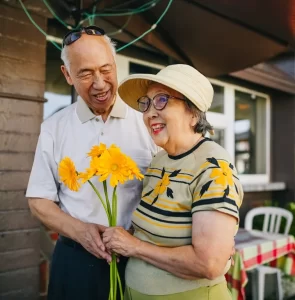 Regardless of the phase of life they’re in, it’s something that all couples think about. How do we maintain our connection for the long run?
Regardless of the phase of life they’re in, it’s something that all couples think about. How do we maintain our connection for the long run?
This month, Princeton Perspectives has teamed up with Brianna Brunner, Couple’s Therapist and founder of Couple’s Therapy Services LLC to provide you with some helpful tips to keep you feeling connected at all stages of your love story.
IN THE BEGINNNG
 Aptly called “The Honeymoon Phase,” the beginning is a time when couples often wear rose-colored glasses, a time when the spark of romance is alive and well, and a time when everyone is on their best behavior. “In this stage of the relationship,” Brunner says, “it’s really important to communicate honestly and openly. What are your values? What kind of lifestyle do you want to lead? Where do you want to live in the long term? Questions like this sometimes get swept under the rug in the excitement of the beginning. People might think that, because they found the right person, they’re willing to compromise indefinitely for them. Unfortunately, when the dust settles and the newness fades, this isn’t always the case.”
Aptly called “The Honeymoon Phase,” the beginning is a time when couples often wear rose-colored glasses, a time when the spark of romance is alive and well, and a time when everyone is on their best behavior. “In this stage of the relationship,” Brunner says, “it’s really important to communicate honestly and openly. What are your values? What kind of lifestyle do you want to lead? Where do you want to live in the long term? Questions like this sometimes get swept under the rug in the excitement of the beginning. People might think that, because they found the right person, they’re willing to compromise indefinitely for them. Unfortunately, when the dust settles and the newness fades, this isn’t always the case.”
So how can you better equip yourself for a love-filled future once the initial sparks and butterflies get replaced with comfort, routine, and competing expectations? Brunner recommends negotiating clear values and visions right from the get-go. “And I don’t think it should be an intense interrogation or feel like a chore,” she says. “Instead, are there ways to make it fun and exciting? To dream up your 3-year plan, 5-year plan, even 10-year plan together?” Brunner recommends having conversations like this around six months into the relationship. “You don’t want to bring up the future too early,” she says. “But you do want to do it early enough to make sure that your values are aligned.”
Brunner explains that the tone of voice and enthusiasm in which you approach a conversation can make all the difference. Instead of coming at it in an accusatory or demanding way: “This is my timeline. I want this to happen by this time, etc.” you can present it as a shared vision and open dialogue. “I’m so excited to have our own home together. I’ll likely be ready in the next year or two. What do you think?”
AFTER HAVING KIDS
 Anyone who has kids will tell you, while rewarding and beautiful and unlike any other life experience, one thing it’s not is easy—especially in relation to your relationship.
Anyone who has kids will tell you, while rewarding and beautiful and unlike any other life experience, one thing it’s not is easy—especially in relation to your relationship.
“1 in 3 couples report being unhappy after having kids,” Brunner says. “This is according to John Gottman, one of the world’s leading couple’s researchers.”
Brunner’s main focus as a therapist is to work with couple’s during this uniquely transitional time. “Between the chaos and the illnesses and the busy schedules and the lack of sleep and the different parenting styles, it can be hard to prioritize your connection” she says.
She explains that one of the main things couples can do to work on their relationship during this stretched-thin period of life is to let the other know what’s on their mind and communicate often. According to Brunner, the after-children phase is often a phase teeming with resentment. It’s common for couples to judge their partner for not doing as much, especially when one partner takes on an undue portion of the household chores and responsibilities.
“The only way to diffuse resentment is to confront it directly,” she says. “Instead of letting judgments build day in and day out, it’s necessary that each individual has a chance to speak up when they feel neglected or undervalued and that a plan is put in place to make a shift. It’s not easy,” she says, “but with intentional communication and re-organizing, the balance can shift, and couples can learn to work as a team.”
Another thing Brunner suggests, is to always find time to be a couple. “It’s hard when becoming a new parent, to see yourself outside of that role,” Brunner explains. “It’s really important, though, that couples still schedule to time to be present in their relationship and romantic life. “Even if it’s a biweekly date night. Anything helps. It should be a priority like any other.”
LATER IN LIFE
 The “Golden years” are touted as a time for well-earned rest, renewal, travel, and leisure. However, couples can feel unmoored and without purpose once they give up their parenting and career identities. It can be challenging to reinvent oneself at this stage in life, but it’s a necessary step towards connection and contentment.
The “Golden years” are touted as a time for well-earned rest, renewal, travel, and leisure. However, couples can feel unmoored and without purpose once they give up their parenting and career identities. It can be challenging to reinvent oneself at this stage in life, but it’s a necessary step towards connection and contentment.
“My suggestion to older couples,” Brunner says, “is to never stop living. What I mean by that, is push yourselves to try new things, break out of habits and routines, maintain friendships and a social life, and find new vantage points for your connection.”
According to Brunner, it’s common for older couples to stay inside, stick to habit, and avoid things that can be perceived as dangerous or intimidating. After being with a partner for so long, there’s comfort in the routine and consistency. However, new experiences build connection regardless of the age.
Now, Brunner isn’t suggesting that an 85-year-old couple takes up skydiving together. “It doesn’t have to be something really high stakes like a cross-country road trip. Instead, couples can do things like take a candle-making class or try a new restaurant with a couple they haven’t seen in a while. Anything to change it up and give things a fresh perspective.”
Brunner believes that partners should never stop dating, regardless of their age. Shared experiences can help facilitate conversation, bonding, connection, and, most importantly, a good time.
LOCAL FEBRUARY DATE IDEAS TO KEEP THE ROMANCE ALIVE
 The winter cold isn’t an excuse to neglect date night. Here are some local date ideas that will keep you and your sweetheart feeling close and having fun.
The winter cold isn’t an excuse to neglect date night. Here are some local date ideas that will keep you and your sweetheart feeling close and having fun.
- Pick out a flavor for each other at the artisanal Bent Spoon
- Catch an arthouse film at The Princeton Garden Theater
- Have an elegant tea at The Princeton Tea House
- Enjoy live art at the McCarter Theatre
- Check out an event at the Princeton Public Library
- Take a yoga class at The Orchard Hill Center
- Have lunch in Palmer Square before checking out the (soon to open) Princeton University Art Museum.
If you and your partner are experiencing stressors of any kind, there are resources around town such as Couples Therapy Services, that can help you find ways to stop fighting and start connecting.
 Lindsay Haber’s writing has appeared in various literary magazines and journals. In addition to writing, Haber teaches Introduction to Creative Writing and Intermediate Fiction at Rutgers University and works as a technical writer for her day job. Find some of her work at lindsayhaber.com.
Lindsay Haber’s writing has appeared in various literary magazines and journals. In addition to writing, Haber teaches Introduction to Creative Writing and Intermediate Fiction at Rutgers University and works as a technical writer for her day job. Find some of her work at lindsayhaber.com. Brianna Brunner is a Licensed Clinical Social Worker in the State of New Jersey. She earned an MSW from Rutgers University and shortly after, began her training at the DBT Center of NJ. Brianna specializes in the treatment of high-conflict couples. Her practice, Couples Therapy Services, provides couples counseling and marriage therapy. It is based out of Princeton and Manalapan, New Jersey and serving all of New Jersey online.
Brianna Brunner is a Licensed Clinical Social Worker in the State of New Jersey. She earned an MSW from Rutgers University and shortly after, began her training at the DBT Center of NJ. Brianna specializes in the treatment of high-conflict couples. Her practice, Couples Therapy Services, provides couples counseling and marriage therapy. It is based out of Princeton and Manalapan, New Jersey and serving all of New Jersey online.